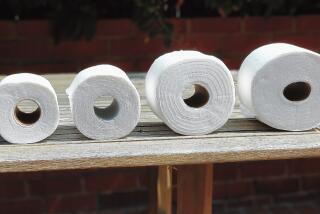Demand Weak; Big Newsprint Maker Delays Price Rise
- Share via
NEW YORK — The world’s largest newsprint maker, pressured by weak demand and resistance from American newspapers, said Monday that it would drastically reduce and delay its latest announced price hike.
Abitibi-Price Inc. of Toronto has told its customers that it decided to increase prices for newspaper customers by $30 to $680 a metric ton effective Feb. 1 instead of the previously announced $695 a metric ton.
But analysts said that unless two smaller U.S.-based newsprint makers announce price increases by next month, this latest rise might not occur.
Last September, Abitibi announced it was raising its newsprint prices to $695 a metric ton, a 6.9% increase, effective Jan 1. Several other manufacturers, including Bowater Inc., the largest U.S. producer, followed suit.
But newspaper officials balked, arguing that the price hikes were unjustified because of weak demand for newsprint. They said a fall in advertising meant they did not need as much paper to print their newspapers.
They also said a buildup of inventories and increased capacity of paper mills starting next year meant a larger supply of newsprint would be available. “We are obviously disappointed that our price announcement for both the U.S. and Canada has had to be modified or, I should say, has been modified,” said Robert Johnson, senior vice president of marketing for Abitibi’s sales and marketing unit in New York. “But we are obviously aware of the realities of the marketplace.”
Canadian Pacific Forest Products Ltd. of Toronto was first to announce last week that it was cutting its previously announced price increase.
But analysts said Champion International Corp. of Stamford, Conn., and Kimberly-Clark Corp. of Dallas started the ball rolling Nov. 1 when they did not notify their customers that they would follow the lead of Abitibi and other bigger newsprint companies that announced their price increases in September.
Under terms of their customer contracts, both companies were required to give two months notice of price hikes. Most other newsprint makers operate under contracts that require three months’ notice to customers.
“The only way these companies can compete is in price,” said one Wall Street analyst who did not want to be named. “If one company increases its price and the next does not then (the company with the higher price) will lose market share.”
The analyst said the big newsprint makers boosted prices on the assumption that fourth-quarter demand would increase. However, that has not happened and “that’s why Champion decided not to increase prices,” he said.
Analysts said the two companies have until Dec. 1 to meet the latest price hike for their customers. If they do not, that could mean even the lower prices might not take effect, they said.
“The handwriting is on the wall,” said Eric Philo, an analyst with the investment firm Goldman, Sachs & Co. “It looks like there will be excess capacity in the next few years.”
More to Read
Inside the business of entertainment
The Wide Shot brings you news, analysis and insights on everything from streaming wars to production — and what it all means for the future.
You may occasionally receive promotional content from the Los Angeles Times.










